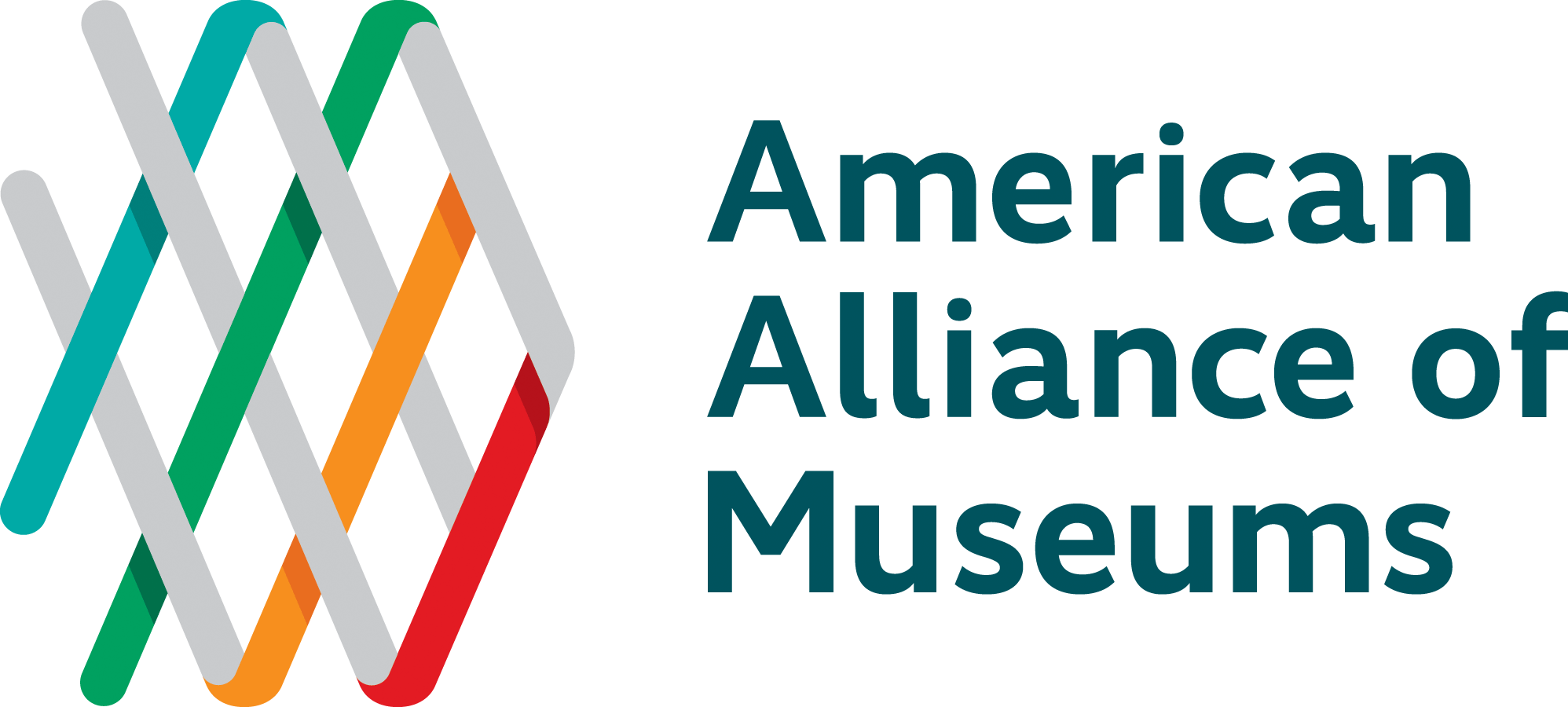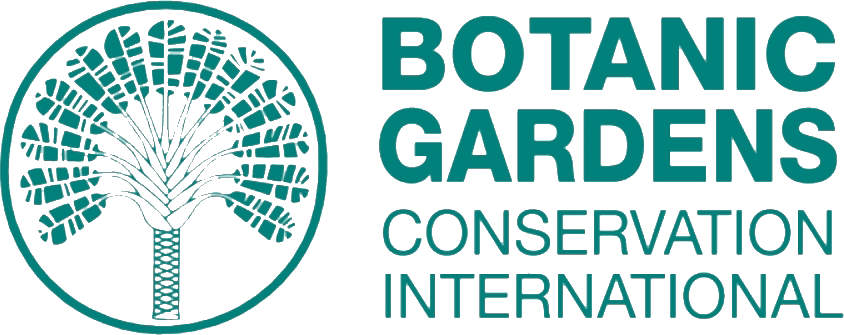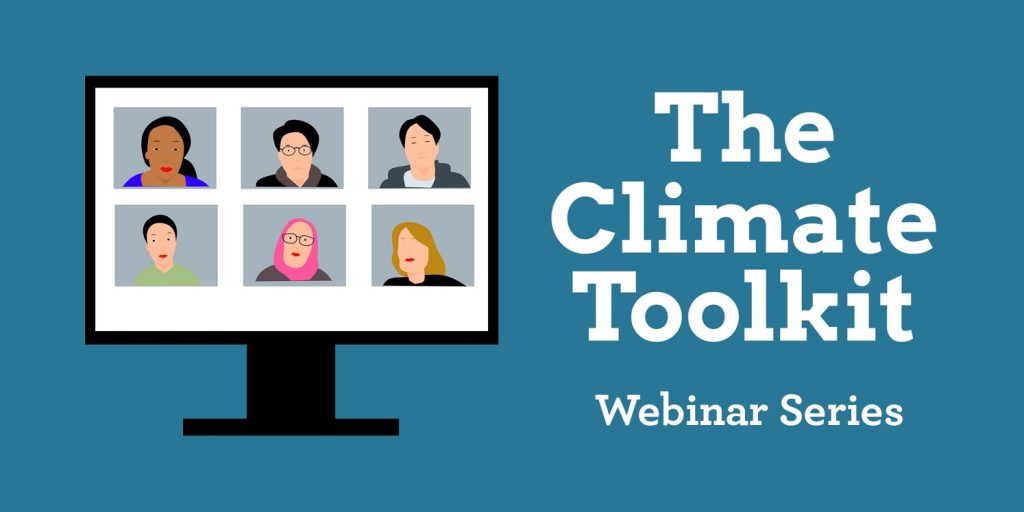
The Climate Toolkit provides free quarterly webinars to keep the conversation going on various Toolkit goals and how to reach them. The webinar series aims to gather organizational leadership and staff members to present and discuss important steps we can all take to address climate change through our programs and policies. Past webinars and workshops can be viewed below.
Webinar 18: Climate Research and Outreach
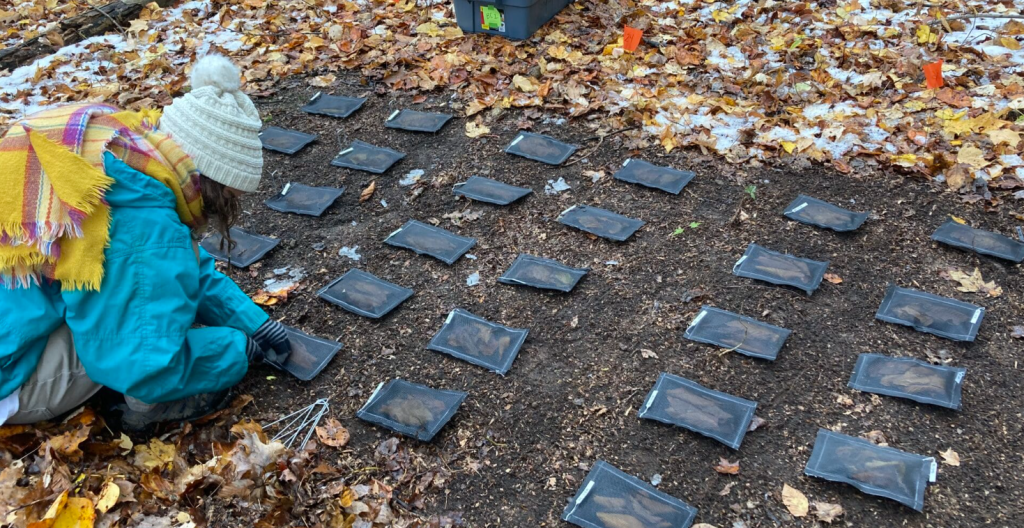
Wednesday, Feb. 25, 1 – 2 p.m. ET – R.S.V.P. to Attend
Our understanding of the climate crisis is dynamic. As cultural institutions, it’s imperative to be working alongside the latest climate research to enhance public understanding and amplify the most effective solutions – now and as the climate continues to change.
Co-presented with the Organization of Biological Field Stations (OBFS), this upcoming webinar on Climate Research and Outreach aims to highlight cross-institutional collaborations between higher education, cultural organizations, and research field stations. We’ll hear from Holden Forests and Gardens, Hiram College, and the University of Akron Field Station on forming regional partnerships and engaging the public with the latest climate change research.
Join us virtually on Wednesday, Feb. 25, 1 – 2 p.m. ET to learn about the ways we can amplify each other’s work, partner together, and collaborate on initiatives to better support effective science communication and impactful climate action.
Please R.S.V.P. by clicking the link in the button below; once registered, you’ll receive a Zoom link to virtually attend. We look forward to having you with us!
Webinar 17: Community Solar Initiatives
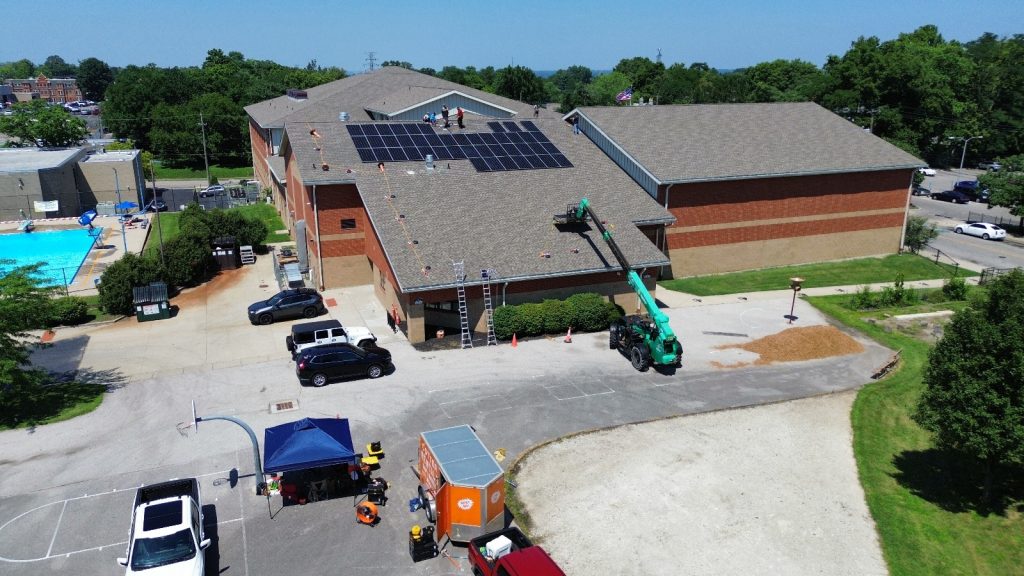
Wed, Oct 1, 2025
Cincinnati Zoo & Botanical Garden has made incredible achievements in climate-conscious operations thanks to its embrace of renewable energy, water reclamation, organic composting, waste recycling, sustainable construction, and responsible sourcing. Yet the Zoo’s green initiatives also extend well beyond the confines of their campus.
Based on 15 years of experience in solar installations and achieving ambitious net zero goals, the Zoo is deeply committed to sharing the success and benefits of renewable energy with their neighbors and has developed the Community Solar Resiliency Program (CSRP) to increase the energy, climate, and financial resiliency of community organizations in under-resourced neighborhoods throughout the Greater Cincinnati area.
Tune in to learn about the Zoo’s unique and innovative community solar partnership which has helped public elementary schools, churches and housing projects achieve energy and climate resilience.
Additional Resources:
Tools of Transformation 6: Regenerative Museums – Principles, Cases and Social-Ecological Futures

August 20, 2025
How can museums reconnect people with nature and inspire future generations to respond to social and environmental degradation? In this webinar, special guest speaker Lucimara Letelier discusses how museums can become active agents of regeneration—cultivating awareness, resilience, and transformation within communities and ecosystems. Based on her research conducted in the UK, she conceptualized the idea of “Regenerative Museums”. In this presentation, Lucimara presents the guiding principles of regenerative practices in museums and shares compelling case studies from various organizations, including some from Brazil and other parts of the globe, illustrating their application.

Lucimara Letelier is the founder and Director of RegeneraMuseu, an organization fostering regenerative and sustainable practices within museums and Culture to champion climate adaptation, mitigation and resilience in Brazil and internationally. ICOM Sustain Vice-chair, Designer in Sustainable Development (Gaia Education/UNESCO partner), trained by Al Gore Foundation, Regenerative Economy and Regenerative Development Institute. She has been a Creative Green Researcher at Julie’s Bicycle, working with consultancy and training in climate leadership for the arts & culture and a Ki Culture Coach. 25 years of experience in arts and culture organizations in Brazil, the US and the UK, including the Museum of Modern Art (Deputy Director), British Council (Deputy Director of Arts), ActionAid (Head of Fundraising), Boston Children’s Museum and the Guggenheim Museum. Master’s in Museum Studies – Green Museum Specialism (University of Leicester, UK) and in Arts Administration (Boston University, US).
Webinar 16: Every Museum Is a Climate Museum
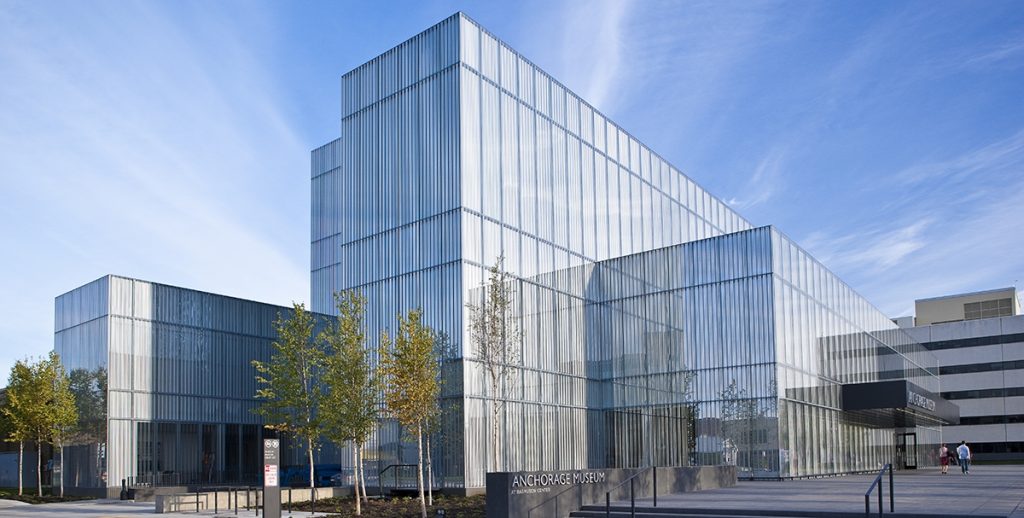
July 16, 2025
The July edition of the Climate Toolkit webinar series presents an interactive brainstorming experience on integrating sustainable practices into daily museum operations. Facilitated by staff from the Anchorage Museum, this session draws on lessons from an institution that has long faced the impacts of climate change and has embedded sustainability in its mission.
This webinar discusses strategies for public engagement, internal efforts such as carbon audits and green teams, and securing sustainable funding. Tune in to explore how your institution can center climate action in the workplace.
Tools of Transformation 5: An Introduction to Essence Thinking

May 21, 2025
Essence is what makes every living being unique, and it is expressed in the ways we engage with the world, our purpose in life, and the unique value we create. The same is true for the essence of natural systems, communities and organizations.
The Climate Toolkit seeks to engage institutions in discovering the latent potential of their essence in a way that reveals their embedded relationships to the people and place they serve as well as the ecological, social and historical context in which they work. By engaging in this level of deep discovery, institutions will be able to ideally position themselves to foster reciprocal and unique opportunities to address climate change between themselves, their communities and the earth.
Watch and engage with our latest Tools of Transformation session for an introduction to essence with guest speaker Sonja Bochart, Director of Shepley Bulfinch and alumna of The Regenesis Institute for Regenerative Practice.
Webinar 15: Electrification Strategies
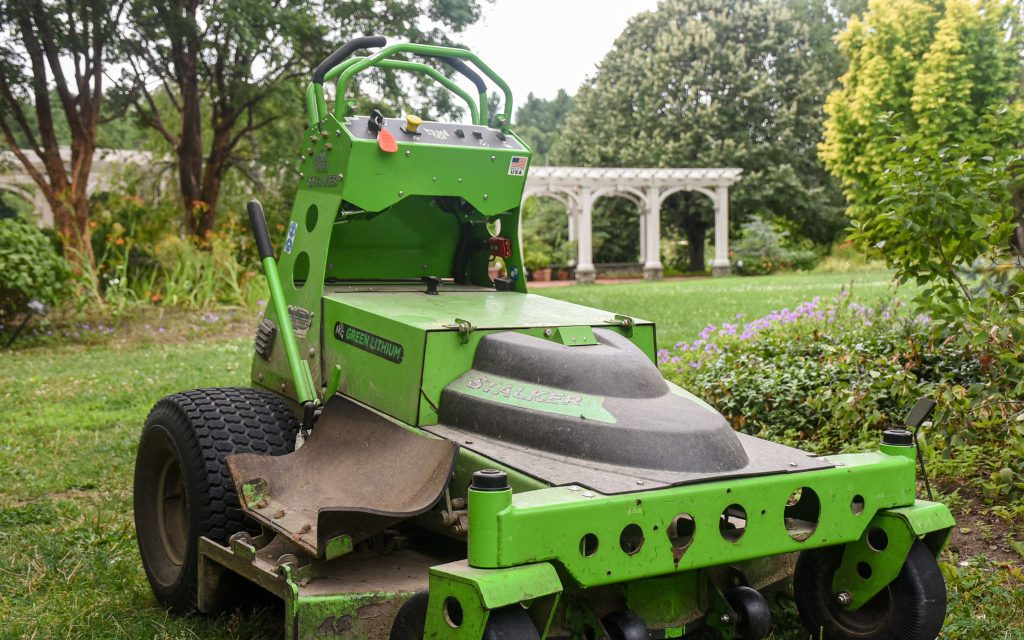
March 26, 2025
In order to truly minimize our carbon footprints, cultural institutions must electrify operations to the greatest extent possible – this includes making the switch from fossil-fuel-based landscaping equipment, fleet vehicles, and building HVAC systems to their clean electric alternatives.
To this end, the Toolkit’s Electrification Working Group has been meeting quarterly since 2023, with over 30 member institutions engaged in trading resources and best technologies towards achieving this goal. Now in its third year of operation, this Community of Practice would like to share knowledge and lessons learned with the wider Climate Toolkit network.
Tools of Transformation 4: Three Core Capabilities

January 29, 2025
In the work we’re called to do, perspective plays a large role in shaping our effectiveness. There is a tendency to focus on “problem solving” — identifying the least difficult means to an end and pursing that course to make a challenge or frustration go away, thereby maintaining the status quo. Regenerative thinking compels us to train ourselves to use challenges as an opportunity for strengthening the larger whole in which we work.
Session 4 of “Tools of Transformation” introduces the Three Core Capabilities — Internal Locus of Control, External Considering, and Source of Agency — as practicable skills which can help us to overcome conventional problem-solving tendencies, collected in a framework that you can use to evolve your thinking on any project.
Webinar 14: How Museums are Engaging Audiences on Climate Change
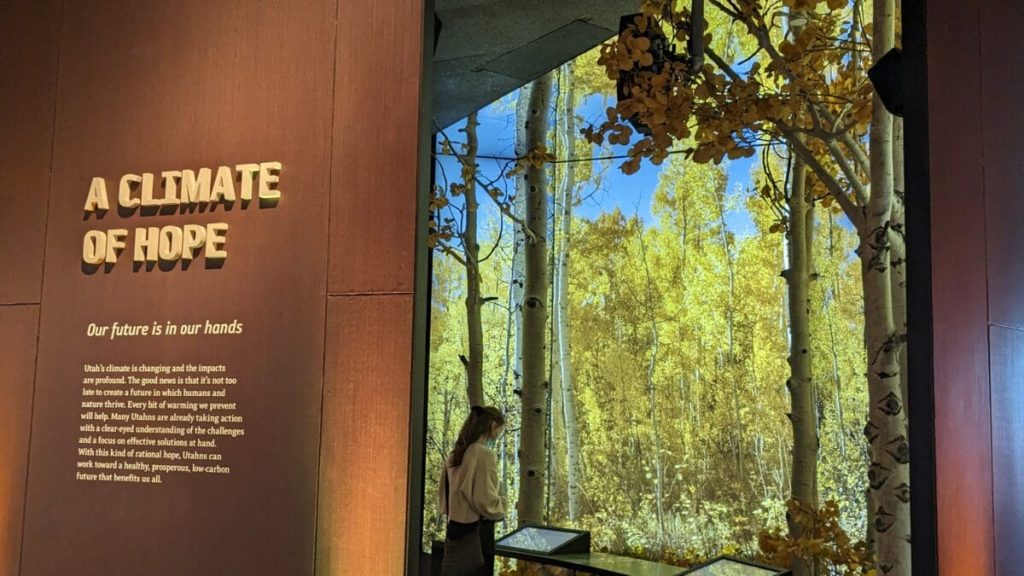
December 4, 2024
Cultural institutions hold unique positions of influence among their communities, serving as trusted hubs of education and knowledge dissemination for the people they serve. As such, museums have a critical opportunity to inform and motivate the public to action in the fight against climate change.
Climate Toolkit Webinar 14: “How Museums Are Engaging Audiences on Climate Change” explores two leading climate change public exhibitions within the museum field. Natural History Museum of Utah details their landmark exhibition “A Climate of Hope” designed to inspire community to work towards a thriving future in a world with a changing climate; followed by an exploration of The Wild Center’s “Climate Solutions”, an interactive, in-depth exhibit about the people, technology, and social movements tackling climate change locally and beyond.
Presenters:
• Lisa Thompson, Exhibit Developer, Natural History Museum of Utah – A Climate of Hope
• Jen Kretser, Director of Climate Initiatives, The Wild Center – Climate Solutions
Check out this exciting presentation of strategies for incorporating climate science and local storytelling within exhibit spaces. We’re excited to share new ways to motivate and activate your visiting public and surrounding community in the collective journey to address climate change.
Tools of Transformation 3: Five Stakeholders
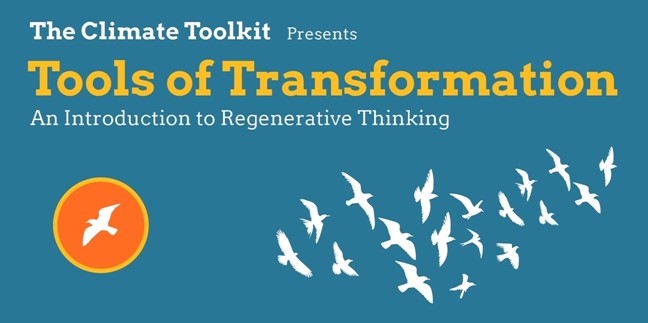
August 28, 2024
In the conventional corporate mindset, success is often defined by the capacity to accumulate and leverage financial return. This is commonly referred to as the “bottom line”. Regenerative thinking proposes that a deeper consideration of the stakeholders at every level of business decision making — and crucially, the consideration of their capacity and potential — will overcome the tendency to compartmentalize priorities and miss connections between stakeholders.
Session 3 of “Tools of Transformation” continues to explore a living systems way of thinking that looks at the interactive dynamic nature of relationships in a way that allows all of your stakeholders — from donors and visitors to employees and the natural world itself — to co-evolve and reach their greatest potential.
Webinar 13: Youth Climate Engagement
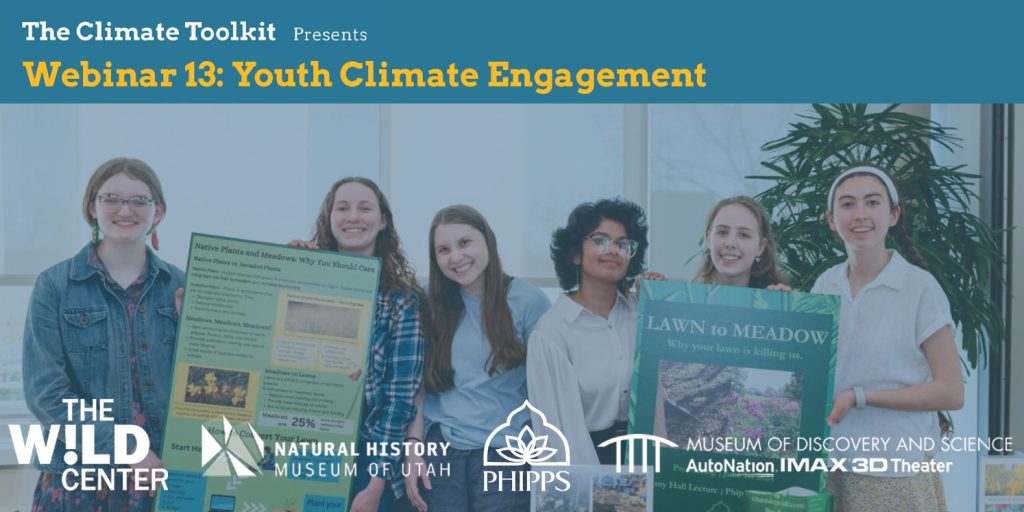
June 12, 2024
Young people are major stakeholders in the future of our planet, yet they rarely have a seat at the table. They seek meaningful change, have brilliant ideas, and bring communities together in ways that no other generation has been able to before. As cultural institutions, we have a unique opportunity to help support young people in their work and learn from them in the process.
Climate Toolkit Webinar 13: Youth Climate Engagement features four case studies of established youth climate action groups at the Natural History Museum of Utah, Museum of Discovery and Science, The Wild Center and Phipps Conservatory. This co-presentation highlights examples of collaborative projects, youth climate summits and resources for getting a youth climate action group started at your own institution.
Slide Decks:
- Natural History Museum of Utah – Critical Action Lab
- Phipps Conservatory – Youth Climate Advocacy Committee
Tools of Transformation 2: Place-Sourced Potential

May 29, 2024
In regenerative thinking, we consider ourselves and the actions we take through the lens of our embedded roles within larger systems. These systems can be defined by the places we live, learn and work. As we reflect on our climate action work this year, can we challenge ourselves to consider the potential of where this work is taking place?
- What contributions can we make to the larger systems we are embedded within?
- What value can our uniqueness bring to the world in the arena of climate action?
- How can we make this happen?
These are some of the questions explored in Session 2 of “Tools of Transformation: An Introduction to Regenerative Thinking.” This new meeting series introduces a living systems way of thinking that looks at the interactive dynamic nature of relationships through a lens which allows all of your stakeholders — from donors and visitors to employees and the natural world itself — to co-evolve and reach their greatest potential.
Climate change is a global responsibility, but the place-sourced potential to address it begins with a deep exploration of one’s own locality — from the unique effects climate change is having on its ecosystem to a vision for what catalyzing change regionally can do to the rest of the world.
Webinar 12: Buildings, Energy and Decarbonization
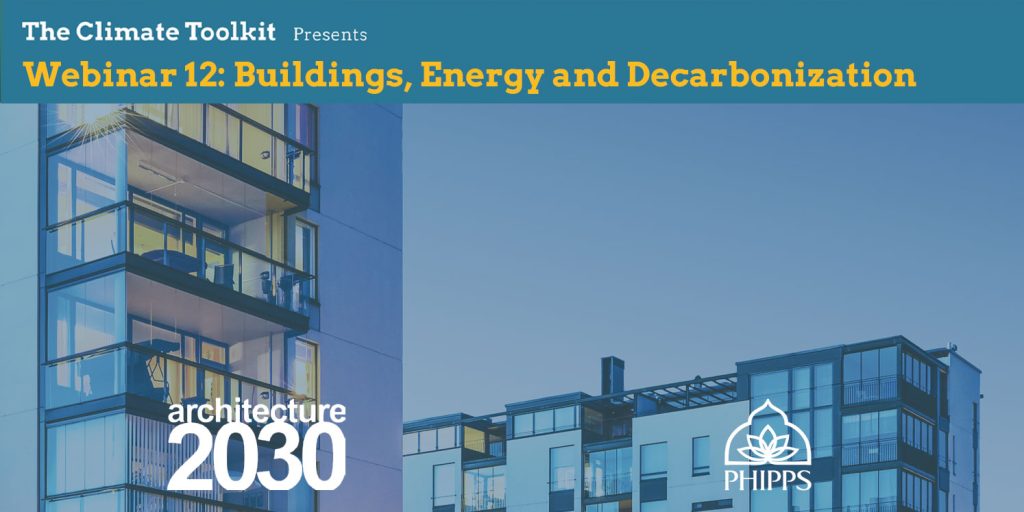
March 13, 2024
The Climate Toolkit has revised its Buildings and Energy focus area with updated climate commitments centered around regenerative design, renewable energy and decarbonization. The new commitments were developed in collaboration with Architecture 2030, an organization whose mission is to rapidly transform the built environment from the major emitter of greenhouse gases to a central solution to the climate crisis.
This one-hour webinar discusses the intersection of buildings, energy and decarbonization and provides resources and examples to help you in your journey toward these vital goals. Vincent Martinez, President and COO of Architecture 2030, presents their updated framework for the entire built environment to meet the Paris Agreement and achieve a complete phase-out of fossil fuel CO2 emissions by 2040; and Richard Piacentini, President and CEO of Phipps Conservatory and Botanical Gardens, discusses how to redefine building project ROI to make your new construction and renovation projects meet your ambitions for efficiency and emissions reduction.
Key Webinar Resources:
Climate Toolkit Workshop: The Inflation Reduction Act for Cultural Institutions
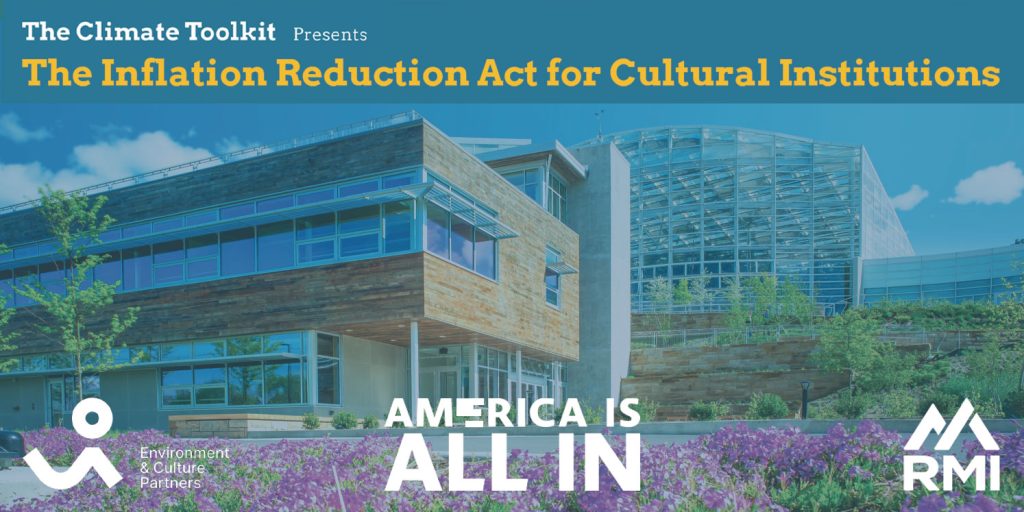
February 14, 2024
RMI, Environment & Culture Partners and America is All In are excited to present a Climate Toolkit Workshop focused on the Inflation Reduction Act.
What is the IRA, and how can it help cultural institutions?
The Inflation Reduction Act introduces groundbreaking opportunities for U.S. based cultural nonprofits seeking funding avenues for clean energy projects and climate-positive design initiatives. Our workshop is designed to provide you with valuable insights into navigating this legislation, unlocking financial support and implementing sustainable practices that align with your organization’s mission.
Key Workshop Resources:
Tools of Transformation 1: Three Lines of Work

January 31, 2024
We’ve all had a chance to interact quite a bit over the past year on the subject of climate action. We’ve talked about best practices and goals, shared our struggles and applauded our shared successes.
In the new year, we look forward to continuing the conversation while introducing something exciting and new.
To understand and demonstrate what “good” really looks like requires a change of perspective. What are better ways to measure success rather than traditional economic ones? How can we secure long-term success, so that our institutions serve a world that reflects our values and preserves a future of learning and growing for generations to come?
These are some of the questions we hope to help you explore in “Tools of Transformation: An Introduction to Regenerative Thinking.” This new meeting series will introduce a living systems way of thinking that looks at the interactive dynamic nature of relationships in a way that allows all of your stakeholders — from donors and visitors to employees and the natural world itself — to co-evolve and reach their greatest potential.
At each new session in this series — the first of which will be held on Wed., Jan. 31 from noon – 1:30 p.m. EST — attendees will be introduced to frameworks designed to disrupt convention, change the way you develop initiatives and make decisions, and help you elevate the work of your fellow staff to its highest levels of potential.
Webinar 11: Nature-Based Solutions
November 8, 2023
Watch our latest webinar on “Nature-Based Solutions for Climate Change“.
Nature-based solutions (NbS) leverage the power of nature and healthy ecosystems to increase carbon storage while decreasing emissions. The latest IPCC report demonstrates that nature-based solutions are among the top five most effective strategies for reducing carbon emissions by 2030 and could provide 30% of the mitigation necessary to stabilize our global climate crisis. In this one-hour webinar, our speakers from Duke Farms, California Academy of Sciences, and The Wild Center present three institutional case studies on a wide array of nature-based solutions being explored by in rural, agricultural, and urban environments to sequester carbon, restore healthy soils, and create biophilic cities.
Webinar 10: How to Establish a Green Team
July 26, 2023
Watch our webinar on “How to Establish a Green Team.” In this one-hour webinar, our speakers from Smithsonian Gardens, Cincinnati Art Museum, and The Florida Aquarium present three institutional case studies on forming green teams in the context of a botanic garden, an art museum and an aquarium. Our guests discuss the impact creating green teams can have in aligning organizational practices and philosophies around climate action; as well as how green teams can extend beyond our institutions to advocate for community change.
Webinar 9: Sustainable Landcare and Ecological Outreach
April 26, 2023
Watch the ninth installment of our free, quarterly Climate Toolkit Webinar Series: “Sustainable Landcare and Ecological Outreach.” In this one-hour webinar, Andrea DeLong-Amaya of Lady Bird Johnson Wildflower Center, Dr. Sonja Skelly of Cornell Botanic Gardens, and Gabe Tilove and Juliette Olshock of Phipps Conservatory discuss the importance of bringing ecological richness, plant and animal biodiversity, climate resilience and regional identity into the communities beyond our properties through unique outreach programming.
ADDITIONAL RESOURCES:
- Wildflower Magazine, Beautiful Roadsides issue
- Roadside Use of Native Plants, book edited by Bonnie Harper-Lore and Maggie Wilson
- Lady Bird Johnson Wildflower Center: wildflower.org
- Cornell Botanic Gardens, Climate Change Demonstration Garden
- Cornell Engagement, Learning by Leading (LxL) Apprentice Program
- NOFA Standards for Organic Land Care
- Phipps Conservatory, Top 10 Sustainable Plants
- Phipps Conservatory, Phipps Sustainable Garden Awards
- Phipps Conservatory, Sustainable Landcare Principles
Webinar 8: Vegan and Vegetarian Foods
Dec.14, 2022
Below, watch the eighth installment of our free, quarterly Climate Toolkit Webinar Series, in which Claudia Pineda Tibbs of Monterey Bay Aquarium and Camille St-Jacques-Renaud of Montréal Space for Life discuss the topic of “Vegan and Vegetarian Foods.” In this one-hour webinar our speakers discuss the climate case for maximizing vegan and vegetarian foods and recount their institutions’ experiences communicating a more planet-friendly food lifestyle.
Monterey Bay Aquarium, Seafood Watch
The EAT-Lancet Commission on Food, Planet, and Health
Food System Economics Commission
Webinar 7: Divesting from Fossil Fuels and Responsible Investing
July 20, 2022
Watch the seventh Climate Toolkit Webinar, featuring Patrick Hamilton from the Science Museum of Minnesota and Richard Piacentini from Phipps Conservatory. In the one-hour webinar, our speakers discuss their journey of transitioning from fossil fuels to mission-centric investment strategies, challenges within the investment sector and more.
Phipps Conservatory Resources:
- Sustainable Investing Part 3 – Case Study of Phipps Conservatory and Botanical Gardens (The American Association of Museums)
- Phipps Investment RFP (Phipps Conservatory and Botanical Gardens)
- Phipps Policy on ESG Investing (Phipps Conservatory and Botanical Gardens)
- Phipps: Green Healthy Spaces (Phipps Conservatory and Botanical Gardens)
Science Museum of Minnesota’s Resources:
- Statement On Climate Change (Science Museum of Minnesota)
- Read Brave Spotlight: Science Museum’s Innovative Heat Recovery System (Saint Paul Public Library)
Other Resources:
- Museums Discover Impact Investing (The American Association of Museums)
- Banking on Climate Chaos Report (Baking on Climate Chaos)
- BLOOMBERG: The ESG Mirage (Bloomberg)
- Fossil Free Funds (Fossil Free Funds)
- Webinar on How to Conduct a Carbon Emissions Audit (The Climate Toolkit)
Webinar 6: Integrated Pest Management, Indoors and Out
March 30, 2022
Our sixth Climate Toolkit Webinar features Drew Asbury from Hillwood Museum and Gardens, Braley Burke from Phipps Conservatory and Holly Walker from Smithsonian Gardens, who discusses climate-conscious practices for pest management, scouting and communication with employees and volunteers, and biological pest control.
Webinar 5: Single-Use Plastics: Reduction Measures, Advocacy and Public Outreach
Dec. 8, 2021
The fifth webinar delves into how institutions are reducing their single-use plastics within their food service, horticulture and animal care practices and how they are conveying those efforts to their staff and guests. Claudia Pineda Tibbs, sustainability and operations Manager of Monterey Bay Aquarium, Richard Piacentini, president and CEO of Phipps Conservatory and Botanical Gardens, and Michelle Allworth, facilities project manager at Phipps, all provided insight into this important topic.
Webinar 4: Climate Change and Water: Reduction, Collection, Research and Outreach.
Sept. 8, 2021
Our fourth webinar explores examples of rainwater collection and reducing institutional water consumption, how new research on how climate change is impacting our waterways, and how to educate the public to follow your lead. The Webinar includes presentations from Dr. Adam J. Heathcote, senior scientist at St. Croix Watershed Research Station and the Science Museum of Minnesota, Joseph Rothleutner, director of horticulture and facilities at Santa Barbara Botanic Garden, and Adam Haas, interpretive program manager at Phipps Conservatory and Botanical Garden.
Webinar 3: Climate Communication – How to Talk to Your Stakeholders About Climate Change
June 9, 2021
The third webinar discusses Climate Communication: How to Talk to Your Stakeholders About Climate Change with presentations from Jeremy Joslin, director of education at the Morton Arboretum, Sarah States, director of research and science education at Phipps Conservatory and Botanical Gardens, and Maria Wheeler-Dubas, science education outreach manager at Phipps Conservatory and Botanical Gardens.
The webinar discusses the best practices for communication about climate change to internal and external stakeholders alike, from using storytelling to help your visitors understand the specific regional impacts of climate change to making climate action and education a part of your strategic plan.
Webinar 2: Calculating Emissions
March 10, 2021
On Wed., March 10, the second installment of the Climate Toolkit Webinar Series reviewed the EPA’s Simplified Greenhouse Gas Emissions Calculator, which allows institutions to establish an essential baseline for implementation of energy reduction strategies. The event featured presentations from Mt. Cuba Center of Delaware and Phipps Conservatory and Botanical Gardens of Pennsylvania, both of whom completed their own baseline audits.
Webinar 1: Energy Solutions
Dec. 9, 2020
On Wed., Dec. 9, our first Climate Toolkit Webinar covered topics including energy reduction, on-site generation and transitioning to renewable energy, and featured presentations from Mt. Cuba Center of Delaware, Phipps Conservatory and Botanical Gardens of Pennsylvania, and Norfolk Botanic Garden of Virginia.
